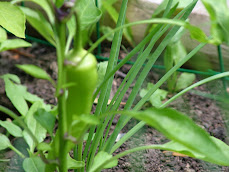Hogmanay (pronounced IPA: [ˌhɔɡməˈneː] — with the main stress on the last syllable) is the Scots word for the last day of the year and is synonymous with the celebration of the New Year (Gregorian calendar) in the Scottish manner. It is, however, normally only the start of a celebration which lasts through the night until the morning of New Year's Day (1 January) or, in some cases, 2 January which is a Scottish Bank Holiday.

When my brother and I are were little, our family celebrated New Year's eve together, and when we were old enough, or lucky enough to coax our parents into allowing us to stay up until midnight, we witnessed a traditional welcoming of the new year. One of the adults would open the back door, and would encourage the old year to take its leave. The front door would then be opened, allowing the New Year entrance into our home, accompanied by a warm welcome. I always assumed that this was a Scottish tradition, but after investigating the aforementioned practice, I found the following, which led me to believe that its origin was British.
A New Year party on the New Year's Eve is the most common type of celebration in England. When at midnight the chimes of Big Ben are broadcast, they drink a toast to the New Year. The most famous celebration takes place in Trafalgar Square in London, where big crowds gather to welcome the New Year. If the family prefer to bring in the New Year at home there is such a custom: the members of the household sat themselves round the hearth, and when the hands of the clock approach the hour, the head of the family rises, goes to the front door, opens it wide, and holds it thus until the last stroke of midnight has died away. Having let the Old Year out and the New Year in, he shuts the door quietly and returns to the family circle.
My Nana..or "Gram" as my cousin called her...would never allow a dirty home to welcome the New Year, so much cleaning and tidying was done prior to the 31st of December. Our bodies were cleaned as well... and then dressed in clean PJ's. After the stroke of midnight my brother and I banged pots and pans on the front stoop. I always thought that this was a welcoming act, but have read that the practice had more meaning. It was an endeavour to drive away evil spirits.
The Scots celebrate New Year with a passion...perhaps more than any other culture. Go here to read about their colourful festivities and traditions. I am sure that what our family practiced was both a celebration of both Scottish and English tradition as we are of both Scottish and English descent.
In closing, I pass on a wish that is above my door all year long. Lovingly stitched by my cousin, it has continued to bless us over the years.






















I celebrated hogmanay with my sister and her family in Scotland in 1993, and it was a New Year's I will always hold fondly in my heart. They really know how to bring in the New Year, the men wore kilts and the women dressed up and it was lovely. We went from home to home picking up people along the way and finally drifted into bed at 8am.....what fun we had. I love visiting Scotland then and now.....Happy New Year......:-) Hugs
ReplyDeleteWendy, it's 6:00am on New Year's Eve Day, and I've been up and playing on the laptop for an hour. The chances of my making it until midnight are very small, but I'll try! I usually fall asleep and my poor hubby will bring in the new year alone. But I CAN make it until 9:00pm when they drop the ball in Times Square! Thanks for the informative post, and I wish you a truly wonderful new year! Glad to have met you in 2009...
ReplyDeletenice! happy new year!
ReplyDeleteI remember doing those things with you when I was little mom...sweeping the old year out, new one in...banging pots and pans!! It was fun! Happy New Year!!
ReplyDeleteI do not understand the needle point? May your lum reek? What does it mean?
ReplyDelete